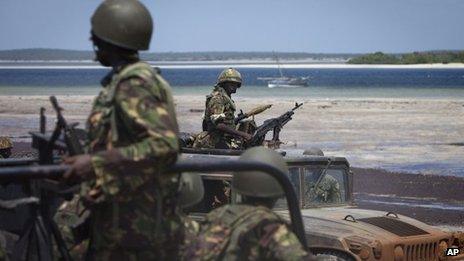Somali militant base of Kismayo attacked by Kenyan forces
- Published

African Union (AU) forces have launched a beach assault and taken control of parts of Kismayo, the last major stronghold of Somalia's Islamist militants, Kenya's military says.
Al-Shabab used the port to bring in weapons and earn revenue.
But the al-Qaeda-aligned group has told the BBC the attack has been rebuffed and none of the city has fallen.
Kenyan troops are part of the AU force trying to wrest control of the country for the new UN-backed president.
Kenyan military spokesman Col Cyrus Oguna told the BBC that parts of Kismayo had been captured and the rest was expected to fall soon.
Col Oguna said the joint operation of the Kenyan Defence Forces and Somali government troops had begun at 02:00 local time (23:00 GMT Thursday) and was "basically amphibious".
"We cannot give casualty figures at the moment, the damage has not been assessed, but I can tell you our forces are already in Kismayo," Col Oguna told the BBC.
"There are some parts that still will be under the control of al-Shabab because we only got there a couple of hours ago, and Kismayo is a big city."
'Shelling'
The beach landing happened on the main road to Mogadishu to the north of the city, where al-Shabab spokesmen say they engaged in heavy fighting with the AU forces.
"It is a lie that Kenyan troops have captured Kismayo. But what they have done was a cowardly act, which was that they brought in troops in four ships to try to capture the city," al-Shabab spokesman Abu Musab told the BBC Somali service.
"And they landed them about nine kilometres (six miles) to the north of the city. Our fighters clashed and attacked them and they are defending themselves where they landed," he said.
The Kismayo residents told the BBC they had seen no Kenyan or Somali government forces inside the city proper.
They said that al-Shabab fighters have been gathering in a district in the north of the city - Buulu Abliko - which was shelled by AU troops.
An eyewitness in Kismayo hospital said he had seen wounded civilians there. Other accounts suggest one civilian has been killed and three others have been wounded
Residents say they can also can hear shelling outside the city and people are scared that the fighting will spread.
Kenyan military spokesman Colonel Cyrus Oguna: "There has been no major resistance"
One of al-Shabab's Twitter accounts tweeted a message at 11.12 GMT saying that two Kenyan armoured personnel carriers were destroyed by an improvised explosive device (IED) and a third one by a rocket propelled grenade (RPG).
Checkpoints have been set up on the main road north of Kismayo, with one eyewitness telling the BBC that the AU forces appeared to include white troops. There have been numerous reports of US special forces operating against the Islamist militants in Somalia.
However, the US Africa command said on Friday it was "not participating in Kenya's military activities in the region".
There are also reports that helicopters are attacking the town, which according to the UN has a population of about 80,000.
The al-Shabab-controlled radio station is still said to be on air.
Earlier this week, Kenyan military jets bombed the airport in Kismayo, destroying an armoury and warehouse used by Islamist militants.
About 12,000 people have fled Kismayo in the past week, the United Nations refugee agency has estimated.
On Thursday, leaflets were dropped urging remaining civilians to evacuate.
BBC World Service Africa editor Martin Plaut says al-Shabab has tried to halt the exodus and has urged civilians to join their fight.
He says the advance by Kenyan forces, Somali government troops and the pro-government Ras Kamboni militia has been delayed as all roads into the city had to be swept inch by inch for mines. This, our correspondent says, explains the attack from the sea.
Kismayo has helped al-Shabab generate millions of dollars from charcoal exports, the UN says, despite a Security Council ban on countries buying such goods from Somalia.
African Union troops pushed al-Shabab from the capital, Mogadishu, in August 2011 and, along with other pro-government forces, have since taken control of most of the other towns previously in militants hands.
However, al-Shabab are still highly active in much of the countryside in south and central Somalia.
Kenya began its intervention in Somalia nearly a year ago after a spate of cross-border attacks blamed on al-Shabab.
Since the overthrow of President Siad Barre in 1991, Somalia has seen clan-based warlords, Islamist militants and its neighbours all battling for control.